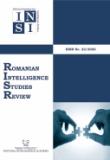FAKE NEWS, ETHICS AND RESPONSIBILITY IN MEDIA REPORTING IN CASE OF SECURITY THREATS AND SENSITIVE ISSUES. AN EMPIRICAL RESEARCH OF THE PRACTITIONERS' EXPERIENCES
FAKE NEWS, ETHICS AND RESPONSIBILITY IN MEDIA REPORTING IN CASE OF SECURITY THREATS AND SENSITIVE ISSUES. AN EMPIRICAL RESEARCH OF THE PRACTITIONERS' EXPERIENCES
Author(s): Ileana-Cinziana SurduSubject(s): Media studies, International relations/trade, Security and defense, Politics and communication, Theory of Communication, Peace and Conflict Studies
Published by: National Institute for Intelligence Studies
Keywords: hybrid Media reporting; security threats; fake news; disinformation; strategic communication; critical thinking;
Summary/Abstract: The article presents the results of an empirical research dedicated to the views that institutional communicators (spokespersons), journalists, and security studies experts hold on the phenomenon of fake news, ethics and responsibility in media reporting in case of security threats and sensitive issues. The study aims to provide a practical overview, capitalizing the on-field expertise of practitioners in security and law enforcement fields, and bridging the three perspectives into a unified approach for efficiently managing strategic communication in media reporting. Aiming to encourage and empower spokespersons to get out of information bubbles, to critically address fake news and develop responsible and accountable communication patterns and behaviors in the relationship with their audience, a sociological field research has been undertaken at the level of three European states: Romania, Spain and Greece. The empirical process aimed to understand the phenomenon of fake news, ethics and responsibility in media reporting in case of security threats, and to identify the training needs, further necessary information and abilities of the target groups. The data were collected from the pool of spokespersons, journalists, practitioners, experts and other stakeholders in the field of security and law enforcement. The research was based on a triangulation process, combining quantitative and qualitative methods, and offering a practical overview on the phenomenon of fake news and ethics in media reporting, strategic communication, critical thinking, media literacy and responsible communication in case of security threats and sensitive issues. The analysis of the processed data allows the identification of a set of good practices, schemes and strategies dedicated to institutional spokespersons, and (young) journalists in the field of security and law enforcement, and relevant stakeholders, in relation to responsible and ethical reporting. It identifies methods of increasing resilience to disinformation and other related aspects, and draws the needs for acquiring, developing and strengthening skills and key competences, in order to foster strategic communication, critical thinking, media literacy, fake news resilience, media ethics and responsible reaction. The results are suitable to be integrated into a practical overview of any type of approach for efficiently managing reporting in case of security threats and sensitive issues.
Journal: Romanian Intelligence Studies Review
- Issue Year: 2020
- Issue No: 23
- Page Range: 192-211
- Page Count: 20
- Language: English

